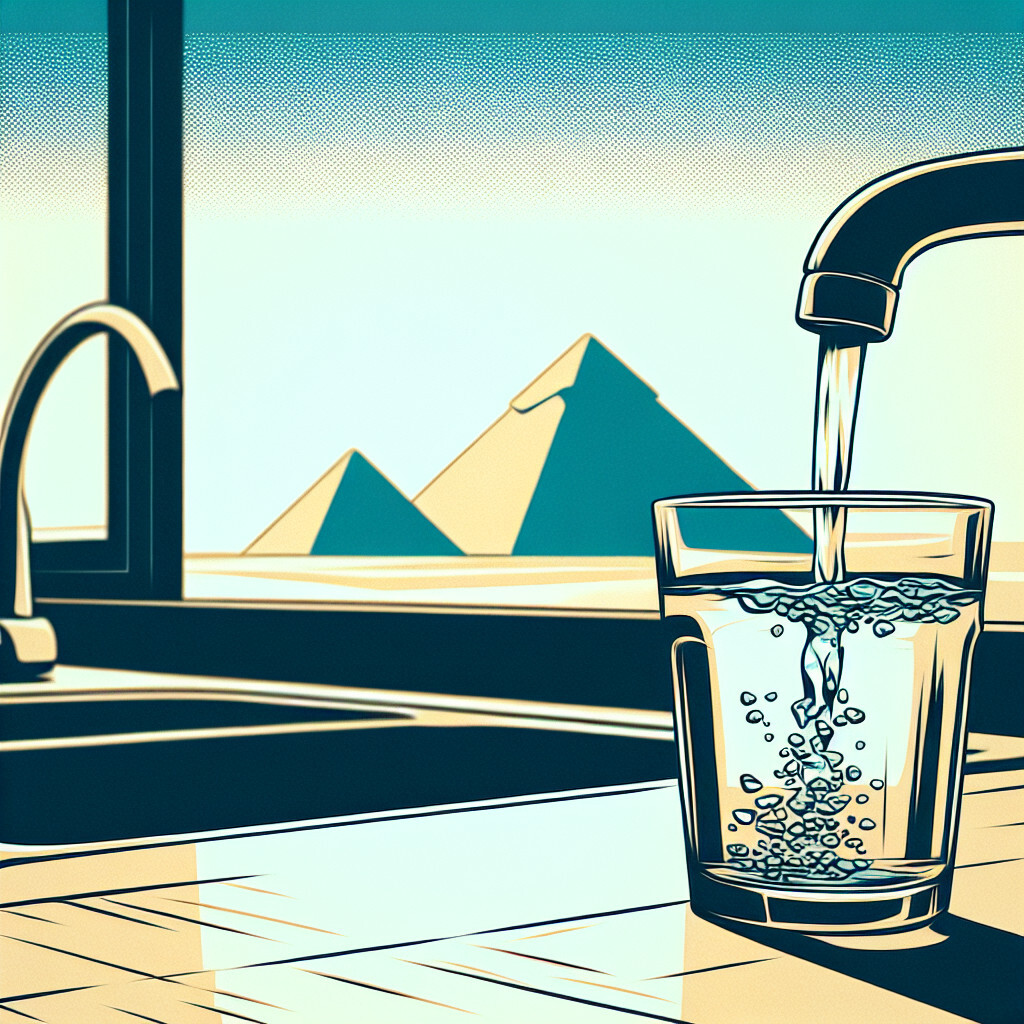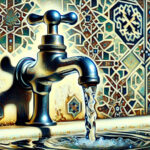-
Table of Contents
“Egypt’s Tap Water: A Question of Quality and Safety.”
Introduction

The tap water in Egypt is generally considered safe to drink, as it is treated in government facilities meeting the World Health Organization standards. However, due to old plumbing systems, the water can sometimes carry sand and other sediments, affecting its clarity and taste. Moreover, the water in some regions may contain high levels of chlorine and other chemicals used in the treatment process. Therefore, while locals may be accustomed to it, visitors often prefer to drink bottled water to avoid potential stomach upsets.
Understanding the Quality of Tap Water in Egypt
Egypt, a country known for its rich history and cultural heritage, has been grappling with a significant issue that affects the daily lives of its citizens – the quality of tap water. The tap water in Egypt has been a subject of concern for both locals and tourists alike, primarily due to its perceived poor quality and potential health risks. This article aims to provide an in-depth understanding of the quality of tap water in Egypt.
Egypt’s water supply primarily comes from the River Nile, which is the country’s main source of fresh water. The water from the Nile is treated in water treatment plants before it is supplied to households as tap water. However, despite the treatment process, the quality of tap water in Egypt has been a matter of concern. The primary reason for this is the high level of pollution in the Nile River. Industrial waste, agricultural runoff, and untreated sewage are dumped into the river, leading to a high level of water contamination.
The water treatment process in Egypt is designed to remove physical and biological contaminants. However, it is not entirely effective in removing chemical pollutants. As a result, the tap water in Egypt often contains high levels of nitrates, heavy metals, and other harmful chemicals. These contaminants can pose serious health risks if consumed over a long period. For instance, high nitrate levels can cause methemoglobinemia, a condition that reduces the ability of red blood cells to carry oxygen. Similarly, heavy metals can lead to various health problems, including kidney damage and developmental issues in children.
Furthermore, the water distribution system in Egypt is old and poorly maintained. The pipes are often corroded, leading to further contamination of the water. In some areas, the water supply is intermittent, which increases the risk of contamination. When the water supply is turned off, the drop in pressure can allow contaminants to enter the system. When the supply is turned back on, these contaminants are carried along with the water.
Despite these issues, it’s important to note that the quality of tap water can vary significantly across Egypt. In some areas, particularly in major cities like Cairo and Alexandria, the tap water is generally safe to drink. The water treatment facilities in these cities are more advanced, and the water quality is regularly monitored. However, in rural areas and smaller towns, the quality of tap water can be much lower.
In conclusion, while the tap water in some parts of Egypt is safe to drink, in many areas, it is advisable to avoid drinking it due to potential health risks. For those visiting Egypt, it is recommended to drink bottled water or use a water purifier. For locals, the government needs to invest in improving the water treatment facilities and the water distribution system. This would not only improve the quality of tap water but also help in safeguarding the health of the Egyptian population. The issue of tap water quality in Egypt is a complex one, intertwined with environmental, infrastructural, and public health concerns. It is a challenge that requires immediate attention and concerted efforts from all stakeholders.
Health Implications of Drinking Tap Water in Egypt
Egypt, a country known for its rich history and cultural heritage, is also infamous for its water quality. The tap water in Egypt has been a subject of concern for both locals and tourists alike due to its potential health implications. This article aims to shed light on the quality of tap water in Egypt and its potential impact on health.
Egypt’s water supply primarily comes from the Nile River, which is the country’s lifeline. However, the river is heavily polluted due to industrial waste, agricultural runoff, and untreated sewage. This pollution directly affects the quality of tap water, making it unfit for consumption without proper treatment.
The Egyptian government has made efforts to improve the water quality by implementing water treatment plants. These plants use a combination of coagulation, sedimentation, filtration, and disinfection to treat the water. However, the effectiveness of these treatment processes is questionable due to the high levels of pollution in the Nile River. Moreover, the water distribution system in Egypt is old and poorly maintained, leading to further contamination of the water.
Drinking untreated or poorly treated tap water in Egypt can lead to several health issues. The most common health problem associated with drinking contaminated water is diarrhoea, which can be severe and life-threatening, especially in children and the elderly. Other waterborne diseases such as typhoid, hepatitis A, and cholera are also prevalent in Egypt. These diseases are caused by bacteria, viruses, and parasites that are present in the contaminated water.
In addition to these infectious diseases, long-term consumption of polluted water can lead to chronic health problems. The Nile River is contaminated with heavy metals such as lead, mercury, and cadmium, which can accumulate in the body over time. These heavy metals can cause a range of health problems, including kidney damage, neurological disorders, and an increased risk of cancer.
Furthermore, the high salinity of the tap water in some parts of Egypt can also pose health risks. High salt intake can lead to hypertension, heart disease, and stroke. Moreover, the high mineral content in the water can lead to kidney stones and other urinary tract problems.
Despite these potential health risks, many Egyptians have no choice but to consume the tap water due to the lack of affordable alternatives. Bottled water is often too expensive for the average Egyptian, and the infrastructure for clean water is lacking in many parts of the country.
In conclusion, the tap water in Egypt is not safe for consumption without proper treatment due to the high levels of pollution in the Nile River and the poor water distribution system. Drinking this water can lead to a range of health problems, from acute diarrhoea to chronic diseases. Therefore, it is crucial for both locals and tourists to take precautions when consuming water in Egypt. This can include drinking only bottled or boiled water, using water purification tablets, or installing a water filtration system at home.
The Role of Government in Ensuring Safe Tap Water in Egypt
The role of the government in ensuring safe tap water in Egypt is a topic of paramount importance. As the most populous country in the Middle East and the third most populous in Africa, Egypt faces significant challenges in providing clean, safe drinking water to its citizens. The government, through various ministries and agencies, has been working tirelessly to address these challenges and ensure the provision of safe tap water across the country.
The Egyptian government, recognizing the critical role of water in human health and economic development, has made significant strides in improving the country’s water infrastructure. The Ministry of Housing, Utilities, and Urban Communities, in particular, has been at the forefront of these efforts. It has embarked on numerous projects aimed at expanding the water supply network, upgrading existing facilities, and improving water treatment processes. These initiatives are designed to ensure that tap water in Egypt meets the World Health Organization’s guidelines for drinking water quality.
However, despite these efforts, the quality of tap water in Egypt varies significantly from one region to another. In urban areas, where the water infrastructure is relatively developed, tap water is generally safe for consumption. The government has invested heavily in modern water treatment plants that use advanced technologies to remove impurities and harmful substances from the water. Regular testing is also carried out to monitor the quality of the water and ensure it is safe for consumption.
In contrast, in rural areas, the situation is quite different. Many rural communities in Egypt still rely on outdated and inefficient water systems that often deliver water of questionable quality. The government, aware of this disparity, has been working to extend the reach of the water supply network to these areas. The Ministry of Water Resources and Irrigation, for instance, has launched several projects aimed at improving water access and quality in rural areas. These include the construction of new water treatment plants and the rehabilitation of existing ones.
The government has also been proactive in addressing the issue of water pollution, which poses a significant threat to the quality of tap water in Egypt. The Ministry of Environment, in collaboration with other government agencies, has implemented various measures to curb pollution and protect water sources. These measures include stricter enforcement of environmental regulations, promotion of cleaner production methods, and public awareness campaigns about the importance of protecting water resources.
Furthermore, the government has sought to involve the private sector in its efforts to improve the quality of tap water in Egypt. Public-private partnerships have been encouraged in various areas, including water treatment and distribution. The government believes that such partnerships can bring in much-needed investment and expertise, thereby enhancing the efficiency and effectiveness of the water sector.
In conclusion, the government plays a crucial role in ensuring the provision of safe tap water in Egypt. Through its various ministries and agencies, it has been working diligently to improve the country’s water infrastructure, address the issue of water pollution, and reduce disparities in water access and quality. While significant challenges remain, the government’s efforts have resulted in notable improvements in the quality of tap water in many parts of the country. However, continued investment and innovation are needed to ensure that all Egyptians have access to clean, safe drinking water.
Comparative Analysis: Tap Water in Egypt vs. Other Countries
Egypt, a country known for its rich history and cultural heritage, has been grappling with the issue of water quality for many years. The quality of tap water in Egypt is a topic of concern for both locals and tourists alike. This article aims to provide a comparative analysis of the tap water in Egypt versus other countries, shedding light on the current situation and the efforts being made to improve it.
In Egypt, the Nile River is the primary source of freshwater, supplying about 97% of the country’s total water resources. However, the quality of this water has been compromised due to pollution from industrial waste, agricultural runoff, and untreated sewage. Consequently, the tap water in many parts of Egypt, particularly in rural areas, is not safe for drinking without prior treatment.
Comparatively, in developed countries like the United States, Canada, and most of Europe, tap water is generally safe to drink. These countries have stringent water quality standards and regular monitoring systems in place to ensure the safety of their tap water. For instance, in the United States, the Environmental Protection Agency (EPA) sets and enforces standards for approximately 90 contaminants in drinking water.
However, it’s important to note that even in these developed countries, tap water quality can vary significantly from one region to another. For example, in Flint, Michigan, USA, a public health crisis emerged in 2014 when the city’s drinking water became contaminated with lead and other toxins due to inadequate treatment.
In contrast, in developing countries like India and Bangladesh, the situation is similar to Egypt. Water pollution is a significant issue, and the tap water is often not safe to drink without treatment. In these countries, groundwater contamination with harmful substances like arsenic and fluoride is a major concern.
Despite the challenges, Egypt has been making concerted efforts to improve its water quality. The government has launched several projects aimed at expanding and upgrading the country’s water treatment facilities. International organizations like the World Bank and the African Development Bank have also provided financial support for these initiatives.
Moreover, Egypt has been exploring innovative solutions to address its water issues. For instance, the country has been investing in desalination technology to convert seawater into freshwater. While this technology is expensive, it could be a viable solution for a country like Egypt, which has a long coastline along the Mediterranean Sea.
In conclusion, the quality of tap water in Egypt is a pressing issue that needs immediate attention. While the situation is not unique to Egypt and is shared by many developing countries, it is clear that more needs to be done to ensure the safety and availability of clean drinking water for all Egyptians. The ongoing efforts to improve water treatment facilities and explore new technologies are steps in the right direction. However, addressing the root causes of water pollution, such as industrial waste and agricultural runoff, is equally important. As the country continues to work towards improving its water quality, it is hoped that the day is not far when every Egyptian will have access to safe and clean tap water.
Q&A
1. Question: Is the tap water in Egypt safe to drink?
Answer: No, it is generally not recommended to drink tap water in Egypt as it may contain harmful bacteria and contaminants.
2. Question: What is the quality of tap water in Egypt?
Answer: The quality of tap water in Egypt varies greatly. While it is treated and should be free of harmful bacteria, it often contains high levels of chlorine and heavy metals, which can make it unsafe for consumption.
3. Question: How do locals in Egypt consume water?
Answer: Most locals in Egypt prefer to drink bottled water or use water filters at home due to the questionable quality of tap water.
4. Question: What measures are being taken to improve the quality of tap water in Egypt?
Answer: The Egyptian government is working on several projects to improve the water infrastructure, including the construction of new water treatment plants and the implementation of stricter water quality standards.
Conclusion
The tap water in Egypt is generally considered safe to drink. However, due to differences in water treatment across the country, the taste and quality can vary. Some areas may have tap water with high chlorine or mineral content. Therefore, while locals may be accustomed to it, visitors often prefer to drink bottled water to avoid potential stomach upsets.






